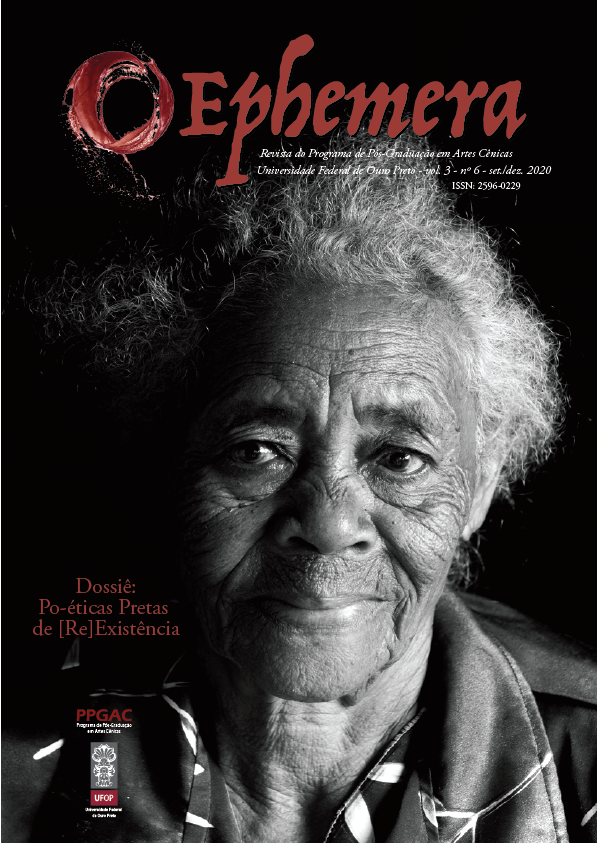Gukurahundi em retrospecto
performance teatral como esfera pública cultural
Resumo
Resistir durante o Gukurahundi era virtualmente impossível, especialmente em campos de detenção como Bhalagwe e Matopo. Gukurahundi se refere ao período da história do Zimbábue, compreendido entre 1983 e 1987, caracterizado por um genocídio não confirmado da minoria étnica Ndebele. Após a implantação da Quinta Brigada em Matabeleland e nas regiões centrais (Midlands), o governo da época impediu o acesso da imprensa a essas áreas, banindo jornalistas sem permissão formal. Enquanto alguns sobreviventes dos campos de detenção e da brutalidade no Gukurahundi compartilharam suas experiências com familiares ao longo dos anos, outros escolheram o silêncio. Dentre as narrativas feitas em primeira mão sobre o Gukurahundi, que emergiram de várias plataformas, uma narrativa “alternativa” começa a infectar a opinião e o discurso públicos. É considerada “alternativa” porque contesta a meta-narrativa governamental de “momento de loucura” (Gaidzanwa, 2015). Neste artigo, discuto o espetáculo de Victory Siyanqoba, denominado Talitha Koum - Alguém mentiu!, como exemplo da habilidade de uma esfera pública cultural em dar voz àqueles que as perderam, como os sobreviventes e seus filhos, de uma forma que perturba o passado, trazendo ao público narrativas históricas alternativas, além de instigar debates e discursos em torno do Gukurahundi.
Downloads
Referências
CONNERTON, Paul. How Societies Remember. Cambridge: Cambridge University Press, 1989.
DEAN, David et al. “Introduction”. ” In DEAN, D.; MEERZON, Y.; PRINCE, K. (Eds). History, Memory, Performance. Basingstoke: Palgrave MacMillan, 2015.
EPPEL, Shria. “’Gukurahundi’: The need for truth and reparation”. RAFTOPOULOS, B.; SAVAGE, T. (orgs). Zimbabwe: Injustice and Political Reconciliation. Cape Town: Institute for Justice and Recollection, 2004.
HIRSCH, Marianne. “The Generation of Postmemory”. Poetics Today, v.29, n.1, 2008, pp. 103-128.
JOHNSON, Katherine. “Performing pasts for present purposes: Re-enactment as embodied performative history” In DEAN, D.; MEERZON, Y.; PRINCE, K. (Eds). History, Memory, Performance. Basingstoke: Palgrave MacMillan, 2015.
KRIGER, N. “ZANU-PF strategies in General Elections, 1980-2000: Discourse and Coercion.” African Affairs, v.104, n.414, 2005, pp.1-34.
MAEDZA, Pedzisai. “‘Mai VaDhikondo’: Echoes from the Requiems from the Killing Fields”. Social Dynamics, v.43, n. 2, 2017, pp. 215-229.
MARTIN, Carol. “Bodies of Evidence”. TDR, v.50, n.3, 2006, pp 8-15.
McGUIGAN, Jim. “The Cultural Public Sphere”. European Journal of Cultural Studies, v.8, n.4, 2005, pp 427-443.
MEREDITH, Martin. Mugabe, Power, Plunder and the Struggle for Zimbabwe. New York: Public Affairs, 2009.
MUPONDE, Robert. “The Worm and the Hoe: Cultural Politics and Reconciliation after the Third Chimurenga” (p176-192), in Raftopoulos, B. and Savage, T. (Eds). Zimbabwe: Injustice and Political Reconciliation. Cape Town: Institute for Justice and Recollection, 2004.
NCUBE, Gibson; SIZIBA, Gugulethu. “Compelled to perform in the ‘other’s’ language? Ndebele Performing Artists and Zimbabwe’s Shonacentric Habitus”. Journal of Southern African Studies, v.43, n.4, 2017, pp. 825-836.
NDLOVU-GATSHENI, Sabelo. “Rethinking ‘Chimurenga’ and ‘Gukurahundi’ in Zimbabwe: A Critique of Partisan National History”. African Studies Review, v.55, n.3, 2012, pp.1-26.
ROKEM, Freddie. Performing History: Theatrical Representations of the Past in Contemporary Theatre. Iowa City: University of Iowa Press, 2000.
ROKEM, Freddie. “Discursive practices and narrative models: History, poetry, philosophy” (pp 19-35). In DEAN, D.; MEERZON, Y.; PRINCE, K. (Eds). History, Memory, Performance. Basingstoke: Palgrave MacMillan, 2015.
WERTH, Brenda. Theatre, Performance and Memory. Memory Politics in Argentina. New York: Palgrave MacMillan, 2010.
Copyright (c) 2020 https://www.periodicos.ufop.br/pp/index.php/ephemera/information/sampleCopyrightWording

This work is licensed under a Creative Commons Attribution-NonCommercial-NoDerivatives 4.0 International License.
O/As autore/as mantêm os direitos autorais sobre os documentos publicados pelo periódico e cedem ao periódico o direito de publicação dos textos e de seus metadados (em múltiplos suportes e formatos), inclusão em bases de dados e assinatura de acordos de indexação atuais e futuros (mesmo com licenças menos restritivas, para os textos, ou sem restrições, para os metadados), de modo a garantir a indexação do documento publicado e de seus metadados.
O documento publicado será distribuído nos termos da Licença Creative Commons Atribuição - Não-Comercial 4.0 Internacional (CC-BY-NC) que permite o uso, a distribuição e reprodução em qualquer meio desde que sem fins comerciais e que o artigo, os autores e o periódico sejam devidamente citados.



